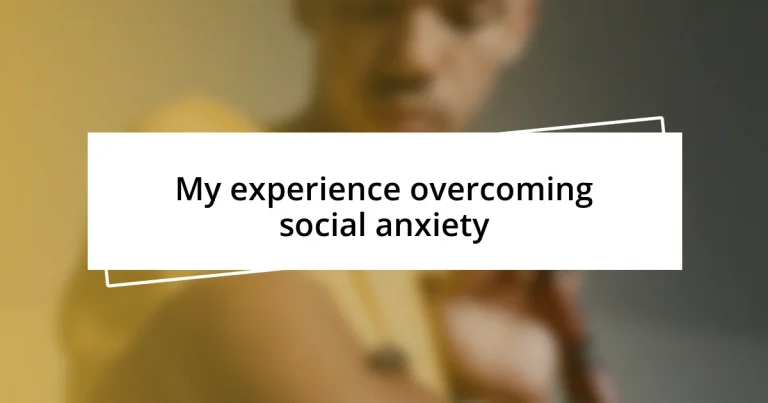Key takeaways:
- Social anxiety arises from a fear of judgment and can be addressed through self-awareness and acknowledgment of feelings.
- Identifying personal triggers, such as crowded spaces or engaging in small talk, is crucial for managing anxiety effectively.
- Developing coping strategies like deep breathing, gradual exposure, and positive affirmations empowers individuals to face social challenges.
- Recognizing and celebrating small victories enhances confidence and reinforces the progress made in overcoming social anxiety.
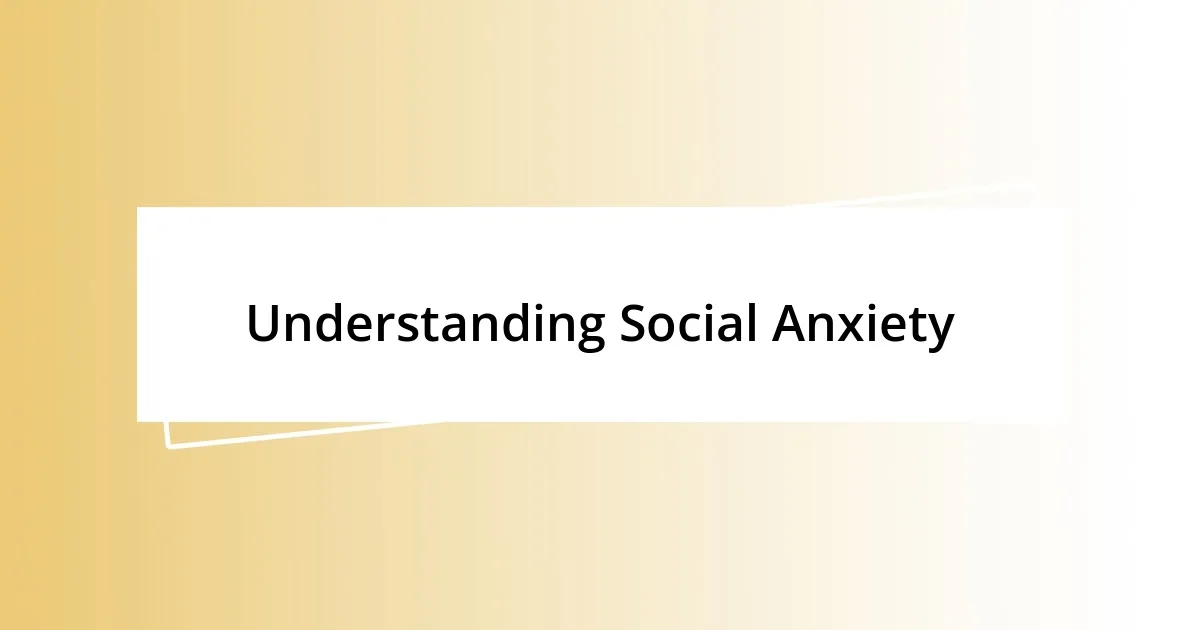
Understanding Social Anxiety
Social anxiety can feel like an ever-present shadow, lurking behind every social interaction. I vividly remember dreading simple gatherings, like a friend’s barbecue, where my mind would race with thoughts like, “What if I embarrass myself?” This kind of internal dialogue can be exhausting, and it’s important to recognize that many people share these feelings, making it a more relatable experience than one might think.
At its core, social anxiety stems from the intense fear of being judged or humiliated in social situations. I recall feeling a knot in my stomach before speaking up in class, convinced that my voice would tremble or that everyone’s eyes were glued to me. Have you ever felt that overwhelming urge to shrink away instead of participating? Understanding this fear can be the first step in realizing that it doesn’t define who we are.
Over time, I’ve learned that social anxiety isn’t just about being shy; it’s a complex interplay of emotions and beliefs. I’ve found that acknowledging my feelings—rather than suppressing them—can lead to deeper insights about myself. Does it resonate with you when you consider how our fears often stem from past experiences? Exploring these connections has helped me understand that breaking free from social anxiety is a journey of self-discovery and growth.
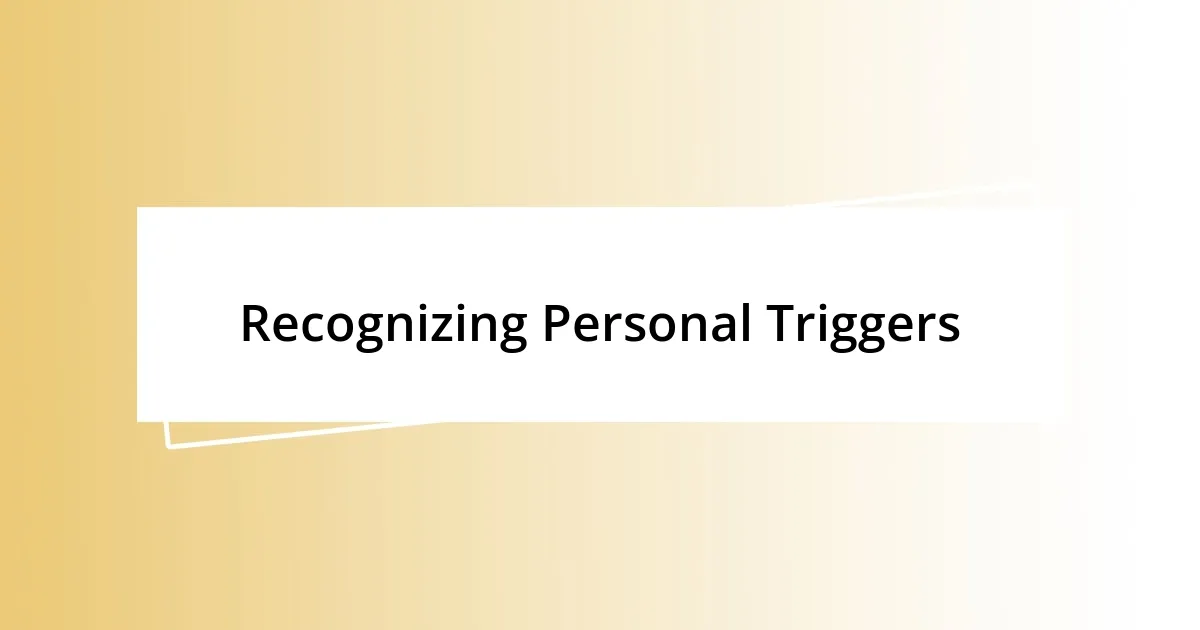
Recognizing Personal Triggers
Recognizing personal triggers can feel like peeling back layers of an intricate onion. Personally, I discovered that crowded spaces often sent my anxiety skyrocketing. Just a few months ago, I attended a local concert. The moment I stepped into the throng, my heart raced, and my palms became clammy. Reflecting on that experience helped me pinpoint how overwhelming environments saturated with unfamiliar faces can unearth my fears.
Another significant trigger for me is the fear of engaging in small talk. I remember attending a networking event, where I was cornered into chatting with strangers. Every question felt like climbing a mountain, fraught with worry about saying something foolish. Identifying this trigger ignited an awareness that it’s not the conversation itself that’s terrifying; it’s the anxiety about how I might be perceived. Have you ever noticed how certain settings or situations make your anxiety flare up? Recognizing these triggering moments is an essential step in managing social anxiety.
Lastly, I’ve also noticed that specific people can trigger my anxiety. For instance, during a family gathering, I felt an inexplicable rush of nerves around an overly critical relative. Acknowledging that their presence often amplifies my discomfort has been pivotal in reframing those interactions. This awareness allows me to prepare mentally and emotionally when I know such scenarios will arise.
| Trigger | My Experience |
|---|---|
| Crowded Spaces | Attending a concert led to overwhelming anxiety. |
| Small Talk | Networking event made casual conversations feel daunting. |
| Specific People | Critical relatives heighten anxiety during family gatherings. |
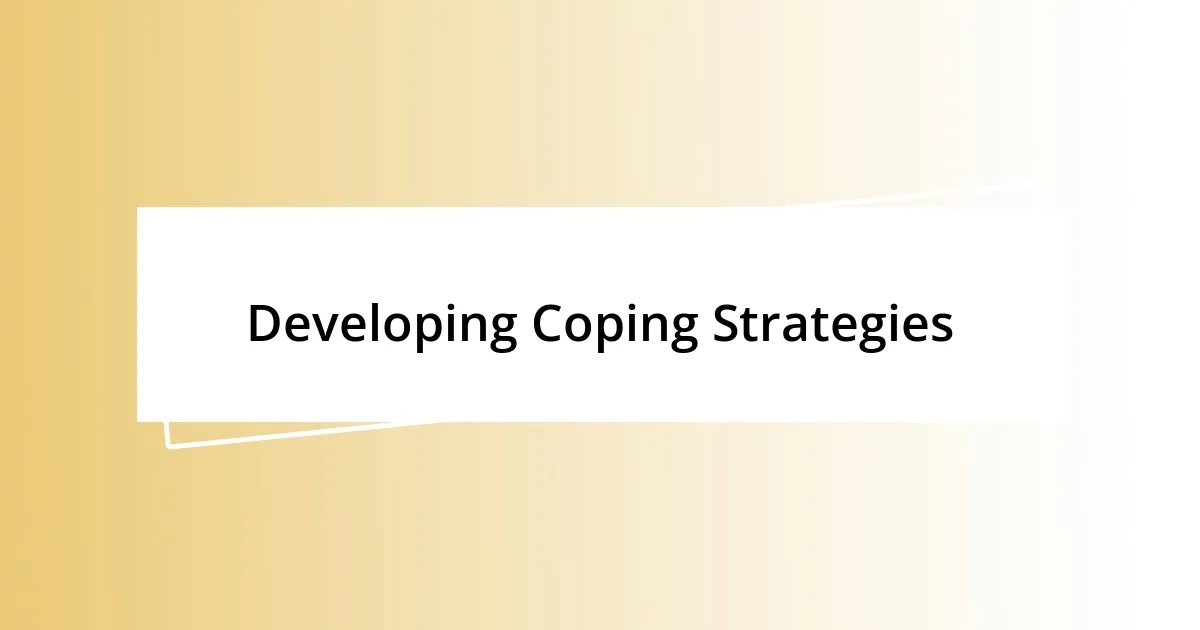
Developing Coping Strategies
Developing Coping Strategies
Building coping strategies was a game-changer for me. I remember the first time I tried deep breathing before a big event. Just taking a few moments to ground myself made a world of difference. It shifted my focus away from the noise of my anxious thoughts, allowing me to mentally prepare for what lay ahead.
To cultivate effective coping strategies, here are some techniques I’ve found helpful:
– Deep Breathing Techniques: Inhale deeply, hold for a moment, and exhale slowly to calm your body.
– Practice Gradual Exposure: Start with small social situations and gradually work your way up to bigger ones.
– Visualization: Picture a successful interaction before it happens; this can help ease tension.
– Journaling: Write about your feelings and experiences to gain clarity and reduce anxiety.
– Positive Affirmations: Remind yourself of your strengths and the progress you’ve made with uplifting phrases.
These strategies became my tools, enabling me to confront situations that once felt daunting, transforming challenges into achievable goals.
I remember a specific occasion where these techniques came into play. At my sister’s wedding, I found myself feeling overwhelmed in a sea of unfamiliar faces. My heart raced as I contemplated making small talk. In that moment, I took a step back, practiced my deep breathing, and silently repeated affirmations like, “I belong here” and “I can handle this.” Regaining that sense of control allowed me to engage authentically, rather than retreat into my shell. Developing coping strategies isn’t just about managing anxiety; it’s about reclaiming those valuable moments in life.
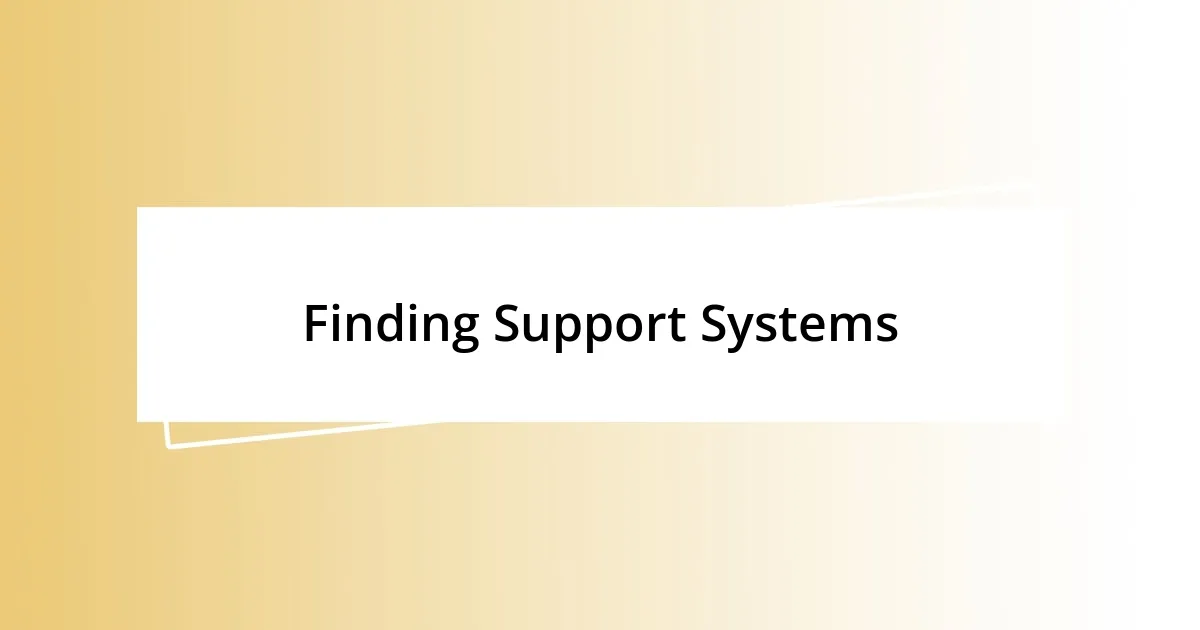
Finding Support Systems
Finding support systems was a pivotal moment in my journey. I vividly remember seeking help from a close friend who understood my struggles with social anxiety. One evening, as we sat at a cozy café, I opened up about my fears of socializing. To my relief, my friend shared similar experiences, which instantly connected us. It made me realize that talking to someone who truly gets what you’re going through can be incredibly freeing. Have you ever felt that sense of relief when someone acknowledges your fears? It’s like lifting a heavy weight off your shoulders.
I also found solace in support groups, both online and in-person. Attending one for the first time felt intimidating, but when I arrived, I was welcomed with warm smiles and encouraging nods. Listening to others share their stories was enlightening. It struck me how universal our challenges can be. I shared a personal experience of struggling in crowded spaces, and the group resonated with my feelings. This shared vulnerability fostered a sense of community that alleviated my loneliness. Isn’t it comforting to know you’re not alone in your battle?
Lastly, I realized the importance of professional support. I hesitated to reach out to a therapist at first, fearing judgment. However, the moment I stepped into that office and started to share my feelings, I could feel a burden lifting. It took time, but establishing that trust with a professional was invaluable. Therapists often provide tools and techniques that friends and family can’t, giving you personalized strategies to manage anxiety. Have you ever considered how a professional perspective could change your approach to tackling anxiety? It made a significant difference for me, guiding me through my experiences with newfound clarity and strength.
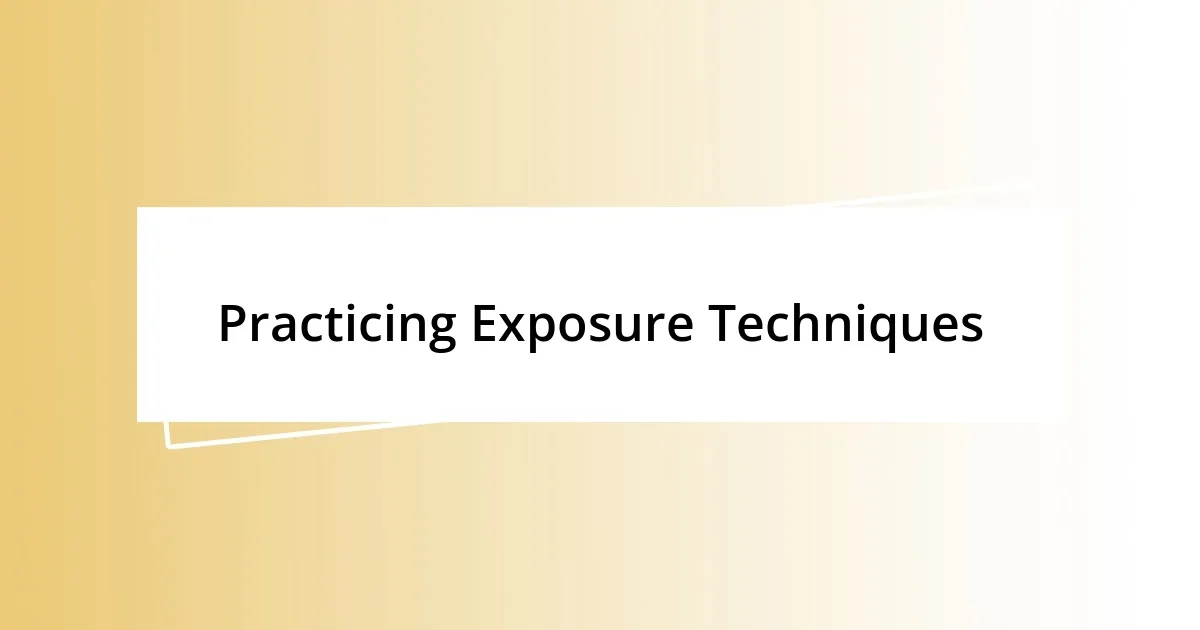
Practicing Exposure Techniques
When I first ventured into exposure techniques, I remember feeling a mix of fear and excitement. I started small, attending a casual gathering with friends rather than a big party. It was nerve-wracking, but I reminded myself, “Every step counts.” Just being there, engaging in light conversations, felt monumental, proving to myself that I could handle social settings.
Gradually, I began to introduce more challenging situations. There was one particular moment that stands out: I decided to approach a stranger at a coffee shop and strike up a conversation. My heart raced, and a wave of anxiety washed over me. But I thought about what I stood to gain; it was liberating to break that invisible barrier I had built around myself. Afterward, I was surprised by how good it felt—did I really just do that? This sense of accomplishment fueled my confidence for the next challenge.
As I practiced exposure techniques, I learned the power of repetition. The more I faced my fears, the less intimidating they became. It’s like a muscle that strengthens with use. I recall a family gathering where I made it a point to engage with everyone, despite my initial discomfort. Each laugh and shared memory chipped away at my anxiety. Isn’t it amazing how facing our fears can lead to some of our most cherished moments? I found that embracing the discomfort was often the first step toward navigating the social world with ease.
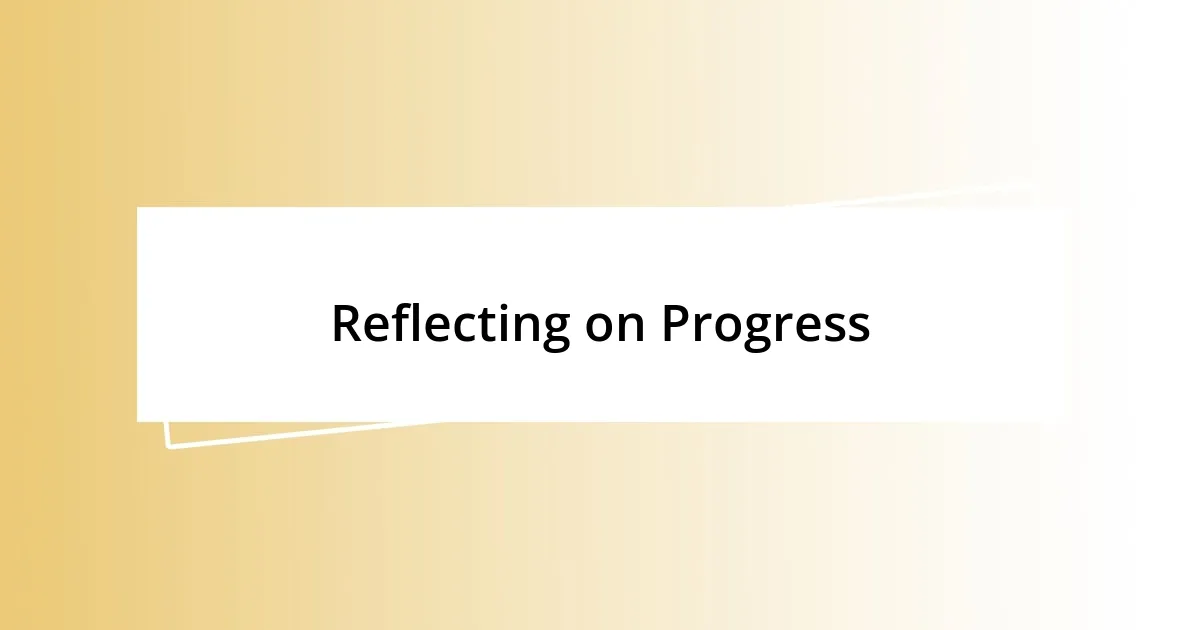
Reflecting on Progress
Reflecting on my progress has been both enlightening and empowering. Looking back on those early days, I can’t help but smile at the small victories I once took for granted. I remember feeling a sense of disbelief after successfully striking up a conversation with a colleague, thinking, “Did I actually just do that?” Each moment of connection became a building block in my journey, reinforcing my belief that I could overcome social anxiety.
As I took stock of my growth, I noted how my perspective shifted. I used to shy away from gatherings, but now, I find myself eagerly anticipating social events. There’s something invigorating about recognizing that my comfort zone has expanded. I think about a recent dinner party where I engaged with ease—I left feeling energized rather than drained. Isn’t it remarkable how our perceptions can evolve?
This journey’s reflections teach me to appreciate both the small and significant moments. Progress isn’t always about grand achievements; sometimes, it’s found in a simple smile exchanged with a stranger or a genuine laugh shared with friends. I often remind myself that each step, regardless of its size, deserves recognition. Have you ever celebrated an unexpected win in your life? Acknowledging these moments helps reinforce the positive changes I’ve made and empowers me to keep moving forward.
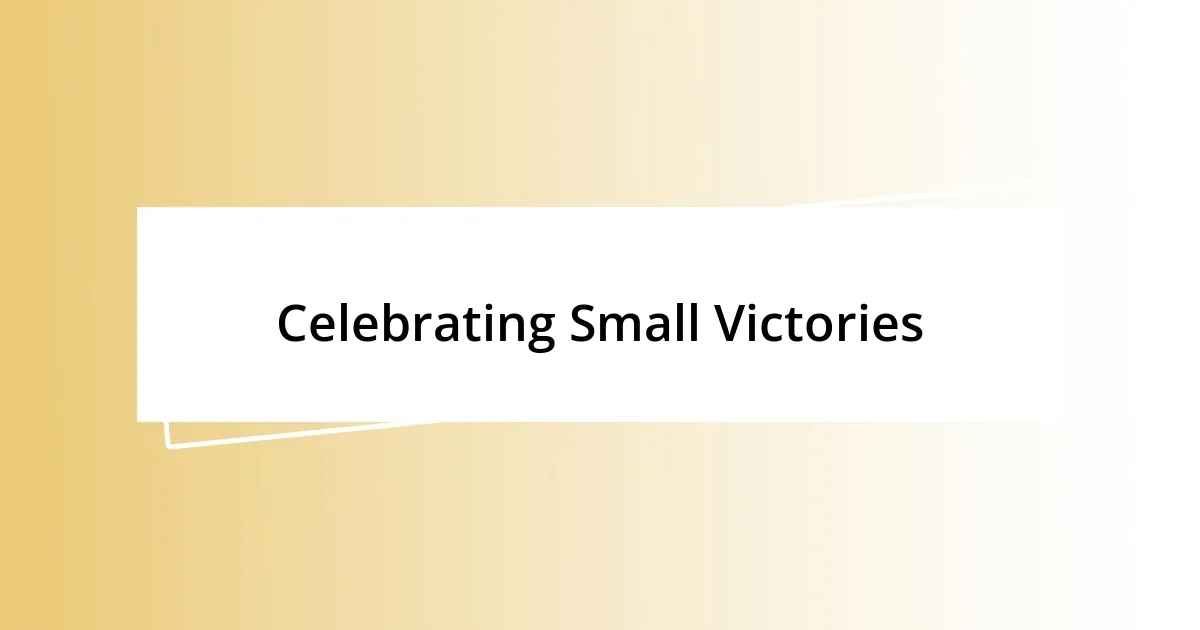
Celebrating Small Victories
Recognizing small victories can be a game-changer in my journey with social anxiety. I recall a day that seemed ordinary but felt monumental: I walked into a café alone and chose a seat at the counter instead of hiding in a corner. The exhilaration that surged through me as I ordered my coffee was unlike anything I’d felt before. Isn’t it funny how something as simple as having the courage to sit alone can shift our entire mood? This once-terrifying act became my little triumph, reminding me that growth is often found in the most unexpected places.
Another time, I noticed a significant victory during a casual conversation with a neighbor. There was a moment when I hesitated, wrestling with the urge to retreat, but instead, I pushed through and shared a lighthearted joke. The warm laughter that ensued was an unexpected gift. What struck me was how something so minor made me feel so connected and alive. It’s remarkable how these small steps can break the cycle of anxiety, transforming what once felt isolating into something joyful.
Each time I celebrate these small victories, I feel more empowered to tackle bigger challenges ahead. The simple act of writing down these achievements in a journal has become a cherished ritual for me. I often ask myself, “What did I do today that made me proud?” It acts as a gentle reminder that even subtle progress is worthy of acknowledgment. These victories strengthen my resolve and serve as constant motivation to keep pushing my boundaries. How do you celebrate your achievements, big or small? Celebrating every success can create a powerful momentum in overcoming our struggles.












